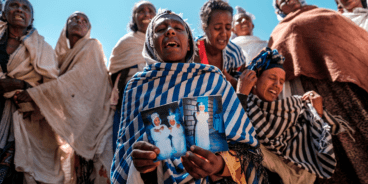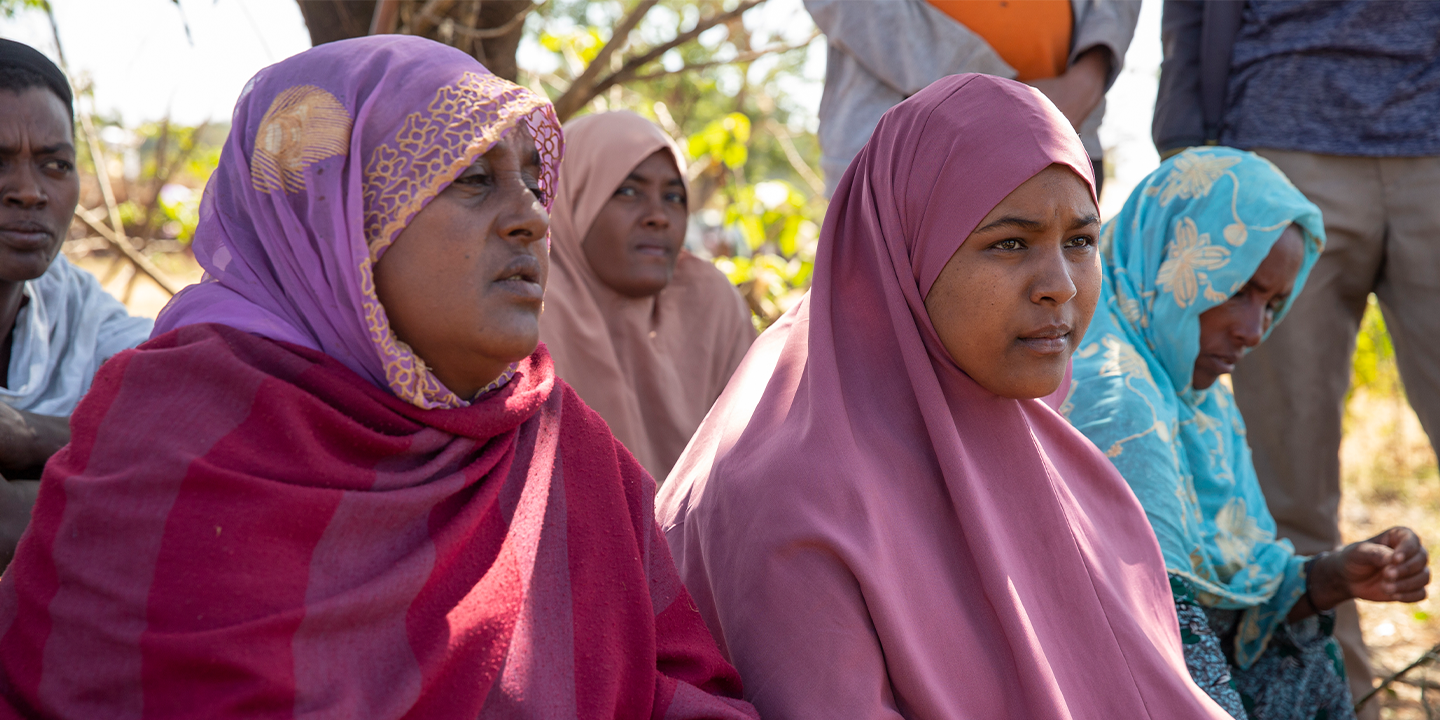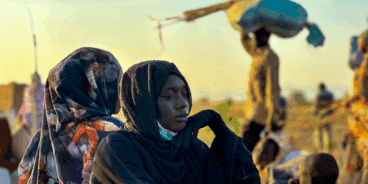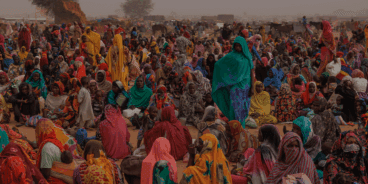

Atrocity Alert No. 416: Ethiopia, Myanmar (Burma) and Food Insecurity
Atrocity Alert is a weekly publication by the Global Centre for the Responsibility to Protect highlighting situations where populations are at risk of, or are enduring, mass atrocity crimes.
TWO YEARS ON, ATROCITIES CONTINUE IN ETHIOPIA’S TIGRAY REGION DESPITE TRUCE
Saturday, 2 November, marked two years since the cessation of hostilities agreement (CoHA) was signed, formally ending the two-year conflict in Ethiopia’s northernmost regions. War crimes and/or crimes against humanity were committed by all parties to the conflict as documented by several UN bodies, including the International Commission of Human Rights Experts on Ethiopia, and international human rights groups. Around 600,000 people were killed and millions displaced during the fighting with victims and survivors continuing to grapple with displacement and the enduring trauma from the violence. Nimrat Kaur, Project Coordinator for Médecins Sans Frontières in Shire, has said the group is “still receiving survivors in need of essential psychological and medical support.”
Some progress has been made regarding accessibility to areas once deliberately cut off from humanitarian aid and international experts. However, despite the CoHA, abuses remain ongoing in border areas, where civilians are facing protection risks. Eritrean troops, who were allied with the federal government during the conflict, remain on Tigrayan territory and have continued to commit abuses, including arbitrary arrests, enforced disappearances and sexual violence. Amnesty International and Human Rights Watch have documented the ethnic cleansing of Tigrayans from Western Tigray by Eritrean forces throughout the conflict and following the CoHA. The failure of the CoHA to address both the presence of Eritrean forces and the sidelining of Amhara forces – who have been fighting their own conflict against the federal government since April 2023 – have led to ongoing unresolved atrocity risks for populations in Tigray and beyond.
Tensions have also flared in other regions, leading to countless threats to populations. The federal government’s plan to disarm regional militias sparked a conflict between the ethnic armed militia known as Fano last year, with intense clashes continuing in Amhara. According to the Ethiopian Human Rights Commission, at least 200 people have been killed since 1 October by the federal government’s drone strikes. Most recently, drone strikes in Gondar, Gojjam and Shoa on 25 and 26 October killed at least 18 people, including a child and an elder at a community health center. Meanwhile, populations in Oromia are facing violations and abuses that may amount to war crimes and crimes against humanity amid ongoing clashes between the federal government and armed militias.
While the federal government has publicly praised its transitional justice policy, progress on justice and accountability remains slow. The Global Centre for the Responsibility to Protect’s Ethiopia expert, Sarah Hunter, said, “The international community should utilize the anniversary to take stock of the implementation of the CoHA and transitional justice policy and ensure any initiative going forward aligns with the needs of affected communities. It is imperative that the transitional justice policy serves the victims of atrocities, otherwise the process may become a catalyst for recurrent violence and risk future atrocities.”
MORE SANCTIONS IMPOSED ON MYANMAR’S MILITARY AS CIVILIANS CONTINUE TO BE TARGETED
On 29 October Canada, the European Union and the United Kingdom announced the imposition of further sanctions on Myanmar’s (Burma) military junta. The sanctions target six entities involved in providing aviation fuel or supplying restricted goods, including aircraft parts, to the junta. These sanctions are the latest in growing attempts to limit the junta’s access to restrict access to the equipment, fuel and funding needed for the commission of atrocities, including the relentless aerial attacks that target civilian areas.
The sanctions come as the junta has widely increased its attacks on civilian populations, especially in areas under control of ethnic resistance organizations (EROs). Last Sunday, 27 October, marked one year since a group of EROs, called the Three Brotherhood Alliance, launched the coordinated attack known as “Operation 1027,” which has become the largest challenge to the junta’s power since the February 2021 coup. Large swaths of territory have been taken by armed groups and the junta has subsequently increased their aerial attacks in retaliation. At least 5,928 civilians have been killed since the coup – 450 of whom have been killed since August 2024 alone. Targeted attacks on civilians and civilian infrastructure are prohibited under international law and amount to war crimes.
Although EROs have been perceived by some as a welcome force attempting to protect populations, some have also been accused of committing additional abuses, compounding risks to civilian populations. This is particularly true in Rakhine State, where ethnic Rakhine forces, like the Arakan Army, have reportedly targeted the minority Muslim Rohingya community, increasing risks to populations who have already been persecuted for decades and suffered a genocide perpetrated by the military in 2017. On 24 October Amnesty International’s Secretary-General Agnès Callamard warned, “Once again, the Rohingya people are being driven from their homes and dying in scenes tragically reminiscent of the 2017 exodus… But this time, they are facing persecution on two fronts, from the rebel Arakan Army and the Myanmar military, which is forcibly conscripting Rohingya men.”
These new sanctions are a welcome development. Nevertheless, collective action at the highest international level is desperately needed to halt ongoing atrocities and further deterioration across the country. Jaclyn Streitfeld-Hall, Director of Policy and Research at the Global Centre for the Responsibility to Protect, said, “Populations in Myanmar have waited too-long for the UN Security Council to address the crises in the country with the urgency it demands. The Council must push for and support a resolution that establishes, at a bare minimum, a regular reporting structure on Myanmar and calls for restrictions on the aviation fuel, finances and materials the junta needs to continue terrorizing its own people.”
UN AGENCIES WARN OF HUNGER CATASTROPHE FUELED BY CONFLICT AND ATROCITIES
Acute food insecurity is anticipated to increase in magnitude and severity in 22 countries and territories, pushing millions of people in these “hunger hotspots” to the brink, warned a new report from the UN Food and Agriculture Organization and World Food Programme. According to the report, conflict and armed violence continue to be the primary drivers of hunger. Food security inevitably worsens when communities are forcibly displaced from their homes, land and jobs due to fighting. Similarly, hunger can exacerbate conflict, as food shortages deepen existing grievances, fueling tensions that may incite violence.
Despite protections afforded to civilians in conflict under International Humanitarian Law and International Human Rights Law, as well as UN Security Council (UNSC) Resolutions 2417 and 2573, international law violations continue to have far-reaching effects on conflict-induced food insecurity and all too often take place with near impunity. Food has routinely been used as a weapon of war, bringing about mass civilian deaths and unfathomable horrors. According to the report, Occupied Palestinian Territory, Sudan, South Sudan, Haiti and Mali are at the highest alert level and require the most urgent attention, meaning they face famine or the risk of famine, or have populations in catastrophic conditions. In all these situations, populations are also facing atrocity crimes.
In the blockaded and besieged Gaza Strip, Israel has committed war crimes and crimes against humanity since 7 October 2023, including starvation as a method of warfare and intentionally directing attacks against civilians and civilian objects, according to the UN Commission of Inquiry. The intentional starvation of civilians, together with statements from Israeli officials, may amount to a constitutive act of genocide.
Populations in Sudan are facing one of the most severe humanitarian crises in the country’s recent history as ongoing atrocities and clashes lead to widespread shortages of goods and services. Famine has been declared in the Zamzam displacement camp and similar conditions are likely prevailing in other sites in El Fasher. Haiti has one of the highest proportions of people facing acute food insecurity in the world as hunger has reached a historic high amid rampant armed violence. In northern Mali, acute food insecurity has reached catastrophic levels due to spiraling conflict and blockades imposed by armed groups that significantly constrain humanitarian operations.
Christine Caldera, Research and Advocacy Officer at the Global Centre for the Responsibility to Protect, said, “Food should never be weaponized. All parties to conflicts must take steps to better protect civilians and their livelihoods from the multidimensional impacts of conflict, including by upholding international law and safeguarding sustainable food systems and markets in conflict.” The UNSC should more effectively utilize the early warning and prevention functions of Resolution 2417 and request regular briefings on contexts where conflict is a leading driver of hunger and famine. The international community must support more long-term investment in development to break the deadly cycle of hunger and conflict and provide additional resources toward political solutions to prevent and end conflicts.
Related Content


Atrocity Alert No. 456: Sudan, Cameroon and Nicaragua
